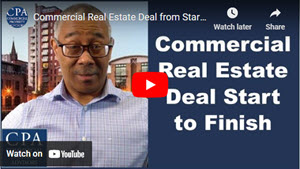
Do you know how to get commercial real estate sellers to say yes to your offers? You don’t want to find yourself in the position of having a great deal and then losing it because you don’t know how to structure your offer.
Imagine you’re speaking with a motivated seller and it’s a once in a lifetime commercial deal. They’ve just told you what’s going on with the property, why they want to sell, and how their ownership of the property is affecting their personal lives. These three pieces of information are the most important things you need to know in order to structure offers to motivated sellers and get them to say yes. Unfortunately, most average investors have no idea how to do this. I’m going to share with you 3 tips to get commercial sellers to say yes to your offer.
Tip 1: Two Keys to Working with Motivated Sellers
Key 1: Off-Market Deals
The first key is to work with sellers of off market deals. Off Market deals are commercial real estate deals that are not on the market. They aren’t listed on MLS or anywhere else online. There is no agent in middle controlling communication between you and the seller, making these the best deals when working with a motivated seller. For this reason, 90% of the deals our company does are off-market deals.
Key 2: Six Basic Needs of Every Commercial Real Estate Seller
The second key is to recognise that there are two aspects to every deal. There is the property aspect and then there’s the human side.
Author and life coach Tony Robbins highlights six basic needs in human life; the need for certainty, variety and change, significance, love, growth, and contributions or the desire to give beyond themselves. In the “human” side of real estate, there are six basic needs of every commercial real estate seller:
- Certainty: Sellers want to be assured that you are going to close the deal.
- Urgency: You must have your financing in order, your inspections scheduled and so forth, so the deal can move quickly. For instance, in a commercial real estate sales contract there are contingencies that force you to put money in their earnest money deposit account if things are not moving along at an appropriate speed. There needs to be a sense of urgency with a motivated commercial real estate seller.
- Gain: Gain is not only about the money; it is also about the sale of the property. Even if there is no profit, people can gain something by selling a property. Every seller has a gain need, it may be to make money or to simply get rid of the property.
- To Be Understood: Every seller has a need to feel heard and to be understood. You must understand what’s going on in their lives, why they are selling the property, and what is going on with the property. It is essential that you understand what their needs are in order to get them to say yes.
- Motives: Be sure that the seller’s motives are addressed. In Tip 2 I will give you three simple but important questions to ask a seller. These questions can reveal a lot and if you structure your offers around seller motivations you are going to win deals.
- Trust: Trust is not the same as certainty. Just because a seller has $10 million in his pocket, doesn’t mean he is trustworthy. Trust is about relationships and it is crucial. From a mentor mindset, you cannot do a good deal with a bad guy. The commercial real estate business is relationship based and they are what help to channel the deals, raise the money and solve any problems that emerge.
You must address all six of these basic needs when working with motivated commercial real estate sellers.
Tip 2: Three Important Questions to You Need to Ask a Motivated Seller
- How Long Have You Owned the Property?
- What’s Prompting You to Sell?
- If You Were to Sell, What Would You Do with the Profits?
Tip 3: Exploring Those Questions and How to Respond to Their Answers
Question 1: How Long Have You Owned the Property?
If the seller has owned a property for a year or two, then it’s not enough time for them to be a motivated seller. Our company’s statistics reveal that once a seller has owned the property for seven years their motivation begins to grow. As a rule, seven years of ownership or longer is what you are looking for.
If they say they’ve owned it for 20 years or more, that means they are nearing the end of their mortgage or they’ve already paid it off. If the mortgage is already paid off and they own it free and clear, this can be a benefit to you because they can be the bank for you. The seller can carry the first mortgage for you, which is a technique that we teach. I highly recommend you read another article of mine to learn techniques on how to buy commercial property without traditional bank loans.
Question 2: What’s Motivating You to Sell?
If the seller’s motive is that it’s time to move on and do something else, that really means they’re not satisfied with their investment for some reason. Perhaps it’s not be performing the way they anticipated.
The seller may say they are tired of managing the property. What they’re really saying is the property isn’t making them any money. It’s even possible they are be feeding their own money into the property every month. A seller in a negative cashflow position is a highly motivated seller.
Another possible motive for selling is that the owner would like to retire. If they say they will miss the monthly income, we have two solutions to offer. Either of these solutions allow us to purchase the property while providing the sellers some monthly income. The first solution is to use a master lease agreement. The second solution is the seller carries a second mortgage. It’s important you watch these two videos so that you can learn these techniques.
Creative Financing for Commercial Real Estate
There are two main obstacles to a seller agreeing to a deal. The first is when they are unsure whether they would like to sell or not. The second roadblock is that they are concerned about paying taxes on the profits they earn from selling. Our straightforward solution is to use a master lease agreement to help them defer from paying their capital gain taxes for two, three, or possibly ten years.
Master Lease Agreement for Commercial Real Estate
Question 3: When You Sell, What Will You Do with the Profits?
If the owner says they want to invest in a larger property, then purchase their property and wish them all the best. If they are anticipating retirement, which is the ultimate life goal, congratulate them and make them an offer.



